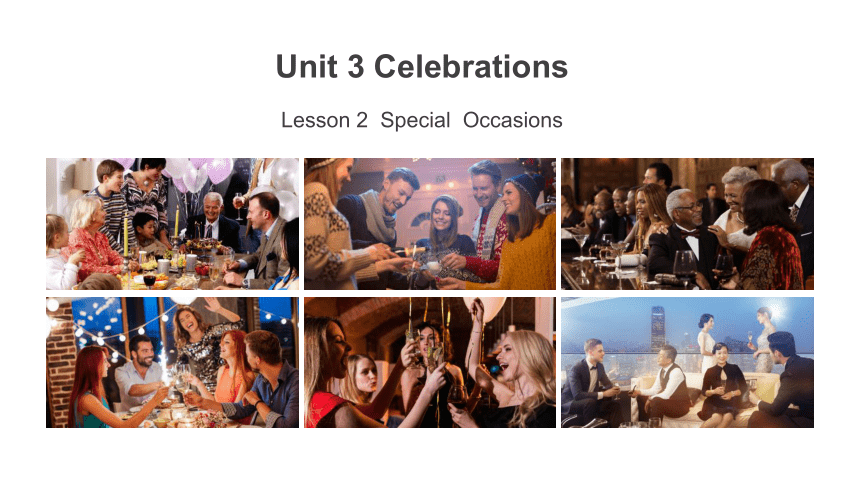(
课件网) Lesson 2 Special Occasions Unit 3 Celebrations 1.When is your birthday 2.How do you celebrate your birthday 3.What’s the best birthday gift that you have received Lead in Will you hold a birthday party Why Lead in make an effort to do sth. 努力做某事 1. Adults can bring a bottle of _____ or beer; 2. Teenagers usually bring sth. like snacks or _____; 3. You always should be _____; 4. When you arrive, it’s _____ to say hello and _____ for inviting you; 5. You should introduce yourself and make a _____ if you don’t know them well; 6. Don’t forget to offer your _____ and good wishes if it’s a _____ party or a wedding; 7. I1t’s also important to _____ to talk to other people. wine puddings on time polite thank the host small talk congratulations graduation make an effort 1. What are the rules for attending parties in general Fast-listening Skill Builder Listening for Specific Information Listening for specific information means to listen for specific words like names, numbers or dates. Before listening, make sure what kind of information you need to listen for. Listen for the first time to get the general idea. Listen again. This time pay attention to the specific information. Careful-listening Listen to an interview about plete the information about party advice in Activity 1. Use the information to talk about party advice in the UK. Let’s talk Some advice at party in the UK: 1.Dress appropriately. 2.Bring something. Say hello and thank the host. (独白) Listen and plete the Talk Builder. Then write F (formal) next to the expressions that are more appropriate for formal occasions. Post-listening Post-listening Imagine you have been invited by your junior secondary school to give an English speech to the graduating students. Prepare a short speech for their graduation ceremony. Use the expressions in the Talk Builder to help you. Example: Congratulations, my fellow students. You have come to the end of junior secondary school and are now looking ahead to new lives in senior secondary school, in which you may face some unexpected challenges… What do you think are the similarities and differences between parties in the UK and in China Critical thinking 被动语态 动词的语态主要分为两种:主动语态与被动语态。主动语态指主语是谓语动词所表示的动作的执行者,两者为主动关系;被动语态指主语是谓语动词所表示的动作的承受者,两者为被动关系。 I have done the job.(主动句) The job has been done by me.(被动句) 1.被动语态根据时态的不同,可分为以下几种常用类型: 一般现在时 am/is/are+done 一般过去时 was/were+done 现在进行时 am/is/are+being done 过去进行时 was/were+being done 现在完成时 have/has+been done 过去完成时 had+been done 一般将来时 shall/will+be done 过去将来时 would/should+be done 类似的词有:ask,tell,invent,expect,warn,advise,make,let, hear,see,watch,feel,notice 但类似see sb doing sth 的句子时则这样变: I heard him reading in the room. →He was heard reading in the room by me. (3)短语动词的被动语态 有 ... ...

